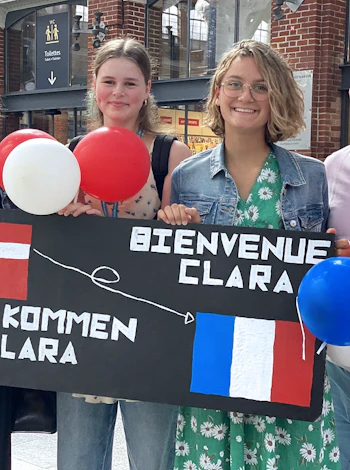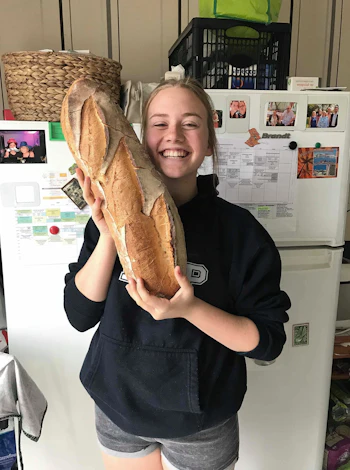High school exchange program in France
Immerse yourself in the French way of life, living with a host family and studying at a local high school.










Experience the
vie en rose in France
Student exchange program to France
France is an enchanting mix of artistic, historic, cultural and gastronomic experiences. Every corner tells a fascinating tale, and every meal is a journey through flavours and traditions.
Enjoy a freshly baked croissant from your local boulangerie; step back in time while strolling through the majestic castles of the Loire Valley; wander the streets of Montmartre, where street artists paint the daily coming and going of people; hike through the Pyrenees trails, enjoying the awe-inspiring scenery. Experience the magic that only France can offer.

Going beyond the myth
Art
French people are the custodians of countless treasures, from iconic monuments to places and artwork known all over the world: the Eiffel Tower, the Louvre Museum with its masterpieces, the picturesque towns overlooking the Mediterranean Sea... Let yourself be blown away by this absolute paradise for art lovers.
What’s high school like in France?
Competence before marks
The practice of recognising educational milestones attained, instead of giving marks, is more and more common in France. This approach focuses on the importance of learning, rather than performance and being defined by a number.
Cutting-edge infrastructure
French schools are a pillar of the community and for this reason, you will find modern buildings equipped with tablets, computers and specialist rooms/laboratories... everything you need for a quality educational experience.
Practical approach
The concept of learning by doing is at the forefront of French schooling. In France, you’ll be on the front line: experiments, practical workshops, group work, research... especially as far as scientific subjects are concerned.
Different schedule
The school day in France is intense, with activities often stretching until 4:30 pm and an extended lunch break to socialise, relax, or complete any assignments. Long school days mean that homework is minimal. Oh, and Wednesday afternoons are usually free!
A stunning country, lots of options. Which program is right for you?
Choose authenticity – trust WEP and prepare to be amazed
On a Classic program, you will experience the most authentic side of France. You may be placed anywhere in the country, depending on the location of the host family who has chosen you to share this incredible adventure with.
Options exist to choose a specific area of France for your placement, thanks to our Classic + program. Options include Brittany, the Pyrenees, the Mediterranean or Atlantic coastlines, and more.
Read more on the next page by choosing the Classic + option, and contact WEP if you'd like to know more about each of the available choices!
Volunteer host family
Public school
Placement anywhere in France
Short-term, semester or year programs available
Live the dream – create a tailor-made program
On a Flex program to France, you will choose a specific school amongst those available, including prestigious private and/or boarding schools in highly sought-after locations. In short: you create an experience tailored to your needs and preferences.
Flex programs offer a very similar experience to Classic programs, however they are not registered and supervised by our Regulating Authorities in Australia, as they do not meet the requirement of a volunteer host family and a volunteer host school applying to Classic Exchange programs. WEP requires the same level of screening and quality of placements from the overseas partner organisations, and program rules and expectations of our students are the same.
Paid homestay family
Private school
Placement in your chosen school
Short-term, semester or year programs available
Your host family during your exchange year
Gain a second family – they can’t wait to welcome you into their lives!
Here is why:
French families are welcoming and have a lot to give; the concept of hosting has deeply rooted in their social fabric over the years. You’ll feel right at home!
There is no French “traditional family”! Leave aside all expectations and be prepared to discover new family set-ups and dynamics, it's all part of the adventure.
You will slide into the routine of a French family. Their daily life and customs will become yours: everyday life, activities, celebrations, food... little by little, you’ll become trés français!


Your school in France
Find out more about your school experience in France
French education is made up of four different cycles: kindergarten from 3 to 6 years of age, primary school until 11 years of age, secondary school until 18 and then, for those wishing to continue studying, higher education.
The French education system
The number of subjects in French schools progresses as students grow, with more courses added each year. Most subjects, including math, French, history and geography are compulsory, but students can personalise their schedule to some extent.
In vocational-type schools, students complete several internships and practical work experiences. In technical and generic lycées, they study lots of different subjects, with a particular focus on humanities and the arts.
Subjects in France
Secondary education is divided in two stages: collèges (four years, for students aged 11-14) and lycées, organised as follows:
- Seconde – the first year – 15-16 years old
- Première – the second year – 16-17 years old
- Terminale – the last year – 17-18 years old
French students can choose which type of lycée to attend, depending on their aptitudes and fields of interest:
- Generic
- Technical
- Vocational
French secondary school
French schools don’t offer many extra-curricular activities. If you wish to play a sport or get involved in a recreational activity, ask your host family or coordinator to help you look for opportunities available locally – clubs, sports centre, youth groups or associations, etc.
School in France is quite demanding; to extend your networks and make friends outside of school, get involved in the community and try new activities and past-times.
Extra-curricular activities
The academic year in France starts in early September and ends in late June or early July. Schools close for regular breaks every six to eight weeks, and in particular:
- in late October (Toussaint) for approximately 10 days
- at Christmas/New year for 2 weeks
- in the winter (February/March) 2 two weeks
- in the spring (April/May) for 2 weeks
The summer holidays last about 2 months and during this time, students usually sign up for recreational activities, camps, excursions or holidays, or simply spend time at home with their family.
The school calendar
Do they use grades and marks in France? Not exactly. French schools prefer to formulate an assessment on the level of competencies acquired by the student, without using numbers.
Numerical scales are still used at university, where grades go from 1 to 20, with 20 being the highest score.
Grades in France
Stories from students and parents who have been there
Here are the testimonials of families who have chosen WEP for their exchange experience.
High School Exchange WELCOME CAMP
Three unforgettable days in Paris
Kick off your exchange program in France with a 3-night Welcome Camp in Paris! During this optional arrival orientation, exchange students are given useful information and advice on how to make the most of the experience ahead of them.
The Paris Welcome Camp includes sightseeing (think Eiffel Tower, the Louvre or Orsay Museum, Versailles Castle, shopping on the Champs Elysées...) and lots of fun activities with exchange students from all over the world!
Join one of our upcoming events
to learn everything there is to know
about our high school exchange programs!
Going with WEP is best
Since 1988, a wide choice of destinations and comprehensive assistance before, during and after your overseas program. WEP is the ideal partner for your big overseas adventure.
Like you, we also get to choose who we travel with: our schools, host families and overseas partner organisations are carefully selected.
We offer a custom-made insurance policy, specifically designed for our participants, and we have a solid network behind us.
Emergency assistance, overseas and from Australia, is available 7 days out of 7, 24 hours a day, 365 days a year.
Allowing all our participants to live their desired overseas experience is a mission, a challenge we're thrilled to accept.
FAQ
Your host family, local coordinator and your host organisation will provide you with support while you are overseas. WEP Australia will remain in contact with the host organisation and your parents to coordinate and support your experience. In case of an emergency, both you and your family will be able to call an emergency phone number that is answered 24/7.
You will be advised of your placement location, host family and host school as soon as feasible. This can range from a few months prior to departure, right up until departure, as a lot needs to happen behind the scenes before each student's placement process is complete and can be communicated to you with certainty. The placement process doesn't only include sourcing a suitable host family, but also finding availability at a local school, and completing all red tape (including, for example, lenghty criminal history checks in some countries). Prior to departure from Australia, all students will receive host family, host school and local coordinator details.
Independent travel is not permissible while on exchange. However, you will be able to travel with your host family, school, host organisation and other community groups such as sporting teams or scouts. Again, the foremost aim of the program is educational, and your priority for any holiday periods must be your host family, who will be investing a lot of time, energy and money into this experience - simply in return for your frienship and positive contribution to their household.
Generally speaking, overseas schools won't issue a diploma to exchange students who are only there for a short time and don't graduate at that school. You may however be provided with a honorary certificate, as well as a WEP certificate of completion, which however don't count towards credit or graduation in Australia.
Language experience is desirable, but not necessary, for most countries. However, some countries have mandatory language requirements. You'll find the specific requirements for each country listed on its page. Intensive language courses may, in some circumstances, meet language pre-requisites. WEP strongly recommends language preparation prior to departure as language knowledge is of enormous benefit in assisting you to quickly adapt to your new family, school and life.
Of course, there are English-speaking destinations available if you are not interested in learning another language.
No, it's the host families who choose the student they wish to invite into their home. Based on the documents you will submit as part of your WEP application, one lucky family will choose to open their home and hearts to you, which is why for all Exchange Classic programs, and many Flex programs as well, there is no avenue for students to choose a specific location.
It may be possible to live with an overseas family that you already know (excluding relatives of the student). However, the family will have to be screened and approved, prepared and supported by our partner organisation in the same manner as any other host family. School enrolment must also be available.
More questions?


